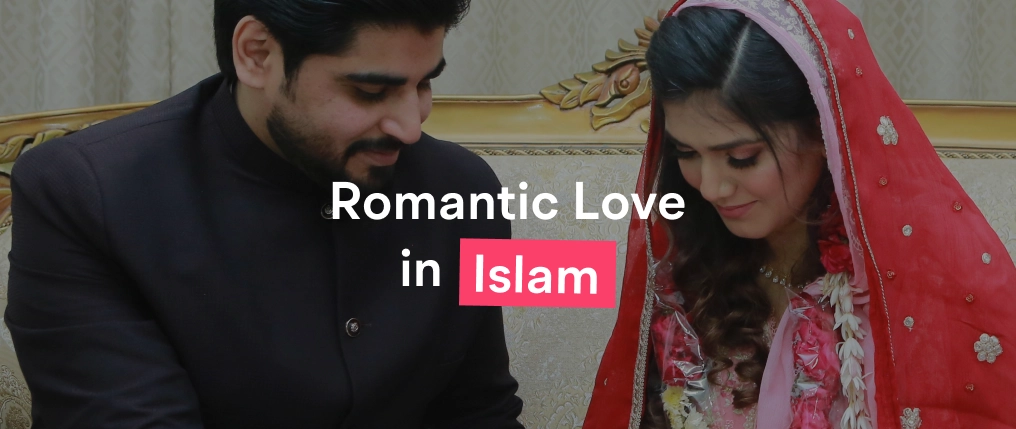
Romantic Love in Islam
March 13, 2024

In the diverse landscape of Islamic teachings, romantic love holds a special place, weaving together spirituality, emotions, and physical connection in human bonds.


Looking for your soulmate?
You won’t find your soulmate on this blog post but you might find them on Muzz - the world’s biggest Muslim dating and marriage app.
Islam sees romantic love as something profound and rich, providing guidance on how to nurture relationships that not only bring fulfillment but also follow divine teachings.
So, let’s dive into the Islamic take on romantic love, exploring its principles, customs, and even looking at how the Prophet Muhammad (PBUH) lived his romantic life as an example.
Table of contents
The Concept of Halal Romantic Love
Balancing Arranged and Romantic Marriages
Prophetic Paradigms of Romantic Love
Navigating Pre-Marital Affections
The Concept of Halal Romantic Love

At the heart of romantic love relationships in Islam lies the principle of ‘Halal Romantic Love’—a lawful, pure, and ethical expression of affection between individuals.
Related content: How To Have A Successful (And Halal!) First Date
Halal romantic love transcends mere physical attraction, embedding itself in the mutual respect, care, and understanding between partners. It advocates for relationships grounded in the sanctity of marriage, ensuring that romantic blossoms within the boundaries set by Islamic law, fostering a deep, spiritual connection.
Romantic Love in Marriages

Islam posits marriage as the cornerstone of societal structure, a sacred union that legitimizes romantic love and companionship. This divine institution is celebrated as a means to fulfill one’s emotional and physical needs while adhering to religious obligations. The sanctity of marriage in Islam elevates the significance of romanticism, urging believers to cherish and nurture this bond with the utmost integrity and faithfulness.
Mutual Rights and Responsibilities
Islam delineates clear rights and duties between spouses, advocating for a relationship built on mutual respect, kindness, and understanding. The Shari’ah emphasizes the importance of fulfilling one’s marital duties with compassion, ensuring that the sacred bond of marriage is nurtured and protected. These guidelines serve as a foundation for a balanced and harmonious partnership.
Overcoming Challenges with Faith and Patience
Like any profound human experience, romantic love in Islam is not devoid of trials and tribulations. Couples are encouraged to face challenges with patience, wisdom, and unwavering faith in Allah’s plan. The strength of a marital bond in Islam is measured by the couple’s ability to navigate life’s ups and downs with grace, always striving to resolve conflicts with empathy and understanding.
The Role of Romantic Love in Family Life
In the Islamic view, romantic love extends beyond the couple, playing a crucial role in the well-being of the family. A loving relationship between spouses sets a positive example for children, fostering an environment of warmth, security, and compassion. This nurturing atmosphere is crucial for the holistic development of children, imbuing them with values of kindness, respect, and empathy.
Balancing Arranged and Romantic Marriages

Islamic societies have historically embraced arranged marriages, wherein families play a significant role in selecting a partner. However, Islam does not preclude romantic marriages, provided they adhere to Islamic ethics and are initiated with consent and honor. Both arrangements are deemed valid, with the ultimate goal being a harmonious and devout marital life.
Choice in Islamic Marriages
Contrary to common misconceptions, Islam advocates for mutual consent and choice in the selection of a life partner. The faith encourages individuals to consider compatibility, piety, character, and mutual attraction in their choice of spouse, underscoring the significance of a harmonious, loving relationship.
Islamic teachings also stress the importance of getting to know one’s potential partner within the ethical guidelines laid out, ensuring that the decision to marry is informed and consensual, laying a strong foundation for a future filled with mutual Romantic and respect.
Prophetic Paradigms of Romantic Love

The Prophet Muhammad (PBUH), with his life and teachings, serves as an epitome of unconditional love, compassion, and kindness. His relationships with his spouses are exemplary tales of romantic love, respect, and mutual support. Through his interactions, the Prophet illustrated that love in Islam transcends the physical realm, embodying mercy, understanding, and a profound commitment to one’s partner.
Prophet Muhammad (PBUH) exemplified remarkable instances of romantic love, compassion, and understanding in his marital relationships, providing timeless examples for Muslims to follow. Here are some notable examples:
- Kindness and Affection towards Khadijah (RA): Prophet Muhammad’s (PBUH) relationship with his first wife, Khadijah (RA), is often cited as the epitome of love and mutual respect. Despite the norms of his time, he remained monogamously married to her until her death. Khadijah (RA) was his confidante and staunch supporter, and he often reminisced about her with great fondness, highlighting the depth of his loyalty.
- Empathy and Support for Aisha (RA): The Prophet’s marriage to Aisha (RA) was filled with examples of affection, playfulness, and deep emotional support. He would often race with her for fun and share meals with her from the same plate, showcasing a lighter, tender side of marital life. Aisha (RA) also played a crucial role in narrating the Hadiths, reflecting the trust and respect the Prophet had for her intellect and memory.
- Respect and Honor for Sawda (RA): Sawda bint Zam’a (RA) was one of the Prophet’s wives who was older and known for her caring nature. Recognizing her qualities, the Prophet (PBUH) showed great respect and honor towards her. When Sawda (RA) aged and was willing to give up her designated time with the Prophet to Aisha (RA), the Prophet (PBUH) instead reassured her of her place in his life, displaying his commitment to fairness and compassion.
- Comforting Maria (RA): Maria al-Qibtiyya (RA) was gifted to the Prophet Muhammad (PBUH), and she bore him a son, Ibrahim, who died in infancy. The Prophet (PBUH) was seen comforting Maria (RA) in her grief, reflecting his empathy and the emotional support he provided to his family members in times of sorrow.
- Consultation and Decision Making with Umm Salama (RA): Umm Salama (RA) was known for her wisdom and was often consulted by the Prophet (PBUH) on various matters. During the Treaty of Hudaybiyyah, when the Prophet’s companions were hesitant to follow his orders due to their disappointment at not being able to perform Umrah, it was Umm Salama (RA) who provided counsel that helped resolve the situation. This incident underscores the Prophet’s willingness to consider and value the opinions of his wives.
These examples not only highlight the depth of Romantic and respect the Prophet Muhammad (PBUH) had for his wives but also serve as guiding principles for Muslims in cultivating respect and understanding in their relationships. His life exemplifies how the essence of romantic love in Islam transcends physical attraction, encompassing kindness, empathy, mutual respect, and deep emotional support.
Navigating Pre-Marital Affections

Islam acknowledges the natural inclination of human beings towards romantic relationships and companionship. However, it advises restraint and purity of intention when such feelings arise before marriage.
Related content: The Ultimate Beginners Guide To Finding Love As A Single Muslim
Young Muslims are encouraged to approach such emotions with wisdom, seeking guidance through prayer and counsel, and channelling their affections towards a halal and blessed union through marriage.
The Pivotal Role of Intention (Niyyah)
In Islam, the purity of one’s intention (Niyyah) in seeking a romantic relationship is paramount. The noble intention of marriage and building a family under God’s grace are highly esteemed. This principle ensures that relationships are founded on sincerity, devotion, and a shared commitment to uphold Islamic values.
Ethical Boundaries and Respect
While Islam celebrates romantic love within marriage, it also sets clear ethical boundaries to maintain the sanctity of this bond. Premarital relationships are guided by principles of modesty and respect, with the aim of preserving the dignity and honor of individuals.
Related content: Are You Sabotaging Your Chances At Finding Love?
The concept of “khulwa” (seclusion with a non-mahram, or someone of marriageable relation) is discouraged to prevent any circumstances that could lead to compromising one’s faith or the purity of the relationship. This emphasis on ethical boundaries showcases Islam’s holistic approach, safeguarding not just the physical but also the emotional and spiritual welfare of individuals.
Conclusion
Romantic love in Islam is a beautiful and complex emotion, deeply intertwined with the spiritual journey of a believer. It is a gift to be cherished, a bond to be nurtured, and a responsibility to be honored with the utmost sincerity and faith.
By embracing the divine guidelines on marriage and companionship, Muslims can forge relationships that not only bring joy and fulfillment in this world but also promise blessings in the hereafter.
Latest Stories
Share this story

